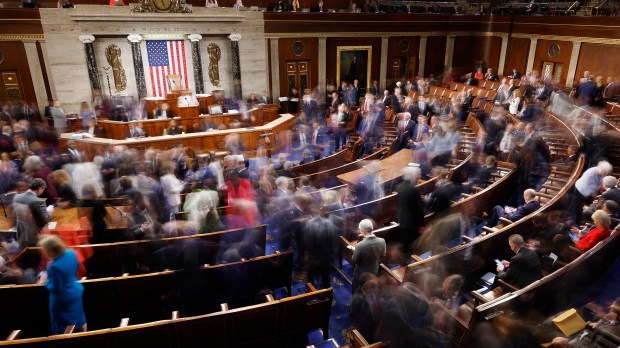Based solely on the stated faiths of US Senators and Representatives, the religious makeup of Congress looks more like America in the late 1970s than today.
A survey of Congress conducted by CQ Roll Call and analyzed by the Pew Research Center suggests that the legislative branch has, in a way, resisted the secularizing trend experienced by the general American population.
“As it begins its 118th session, the U.S. Congress remains largely untouched by two trends that have long marked religious life in the United States: a decades-long decline in the share of Americans who identify as Christian, and a corresponding increase in the percentage who say they have no religious affiliation,” the Pew Research Center said in a report published January 3, the beginning of the new Congressional term.
“Since 2007, the share of Christians in the general population has dropped from 78% to its present level of 63%,” Pew said. “Nearly three-in-10 U.S. adults now say they are religiously unaffiliated, describing themselves as atheist, agnostic or ‘nothing in particular,’ up from 16% who did not identify with a religion 16 years ago.”
Not so in Congress, where Christians – at least in name – make up 88% of the voting members. That is only a few percentage points lower than the Christian share of Congress in the late 1970s, Pew noted. In the 96th Congress, which was in session in 1979-1980, 91% of members of Congress identified as Christian, the polling organization said.
The stats
To break down today’s statistics, there are 303 Members of Congress who identify as Protestant (up from 297 in the 117th Congress); 148 Catholics (down from 158); nine Mormons (no change); eight Orthodox Christians (up from seven), and one Messianic Jew, up from none – Rep. Anna Paulina Luna, R-Florida, who also calls herself Christian.
In addition, there are 33 Jews (down from 34), while each of the following religions have the same number of adherents in the 118th Congress as in the previous one: Muslim (3), Buddhist (2), Hindu (2), Unitarian Universalist (3), Humanist (1), and unaffiliated (1).
Although Catholics are 10 fewer in the new Congress than the previous one, Catholics make up about 28% of the Members – a greater share than in the U.S. population overall (21%). Catholics account for a slightly greater share of House than Senate Members (28% and 26%, respectively), Pew said. A greater share of Democrats are Catholic than are their colleagues across the aisle (31% vs. 25%).
The CQ survey, conducted by questionnaires and followup phone calls, asked Members what religious group, if any, they belong to. It does not attempt to measure their religious beliefs or practices, Pew pointed out.



